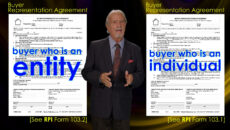Selling agents with homebuyers shopping for their dream homes, take note: a few keen observations about a property can help you determine whether your buyers are getting a bargain. California is climbing out of a recession that left many homes (especially foreclosures) vacant for quite some time, susceptible to water damage, mold, rodent infestation and other products of neglect. A knowledgeable agent can spot blemishes and narrow down the search.
As you drive up to the residence, note the number of “For Sale” signs in the neighborhood. If it seems like there are too many homes for sale, inquire as to why so many neighbors are moving.
Assess the condition of the home’s exterior. Is the roof in good condition? Is the lawn mowed? When a home is well-manicured on the outside, it is more likely the interior of the home will be clean and organized (and vice versa).
When looking for water damage, pay special attention to how the interior of a home smells. If it smells bad, or too good, there might be mold. Sellers will often use artificial air freshener to mask any unwanted odors.
Open the kitchen cabinets and survey for rodent droppings. If a home has been vacant for quite some time, it is especially important to scour the property for unwanted tenants.
first tuesday take: Now, when a vast number of properties are on the market, a selling agent must conduct a thorough property inspection to help narrow down their buyer’s options. However, selling agents must first insist on full disclosure from the listing agent before preparing and submitting an offer. A listing agent will gladly hand over up-front disclosures if they are fully apprised of their seller’s liability for failure to do so and if they have Holmes-proofed themselves. [For more information regarding Holmes-proofing the seller, see the November 2010 first tuesday article, Holmes v Summer: dilatory disclosures and the damage done.]
Re: “Real estate red flags” from Yahoo Finance














I have discovered that it is a really good idea for the listing agent to be at home inspections. The problem arises when the home inspector asks the buyer’s agent, because the listing agent is not there, for information and they give false info (knowing or unknowing). This happened to me and it took a lot of effort to undo the false home report. Nip it in the bud, be there and have your facts ready for the inspector so he/she can give an accurate report, not one that calls for the seller to give gigantic price concessions to the buyer.